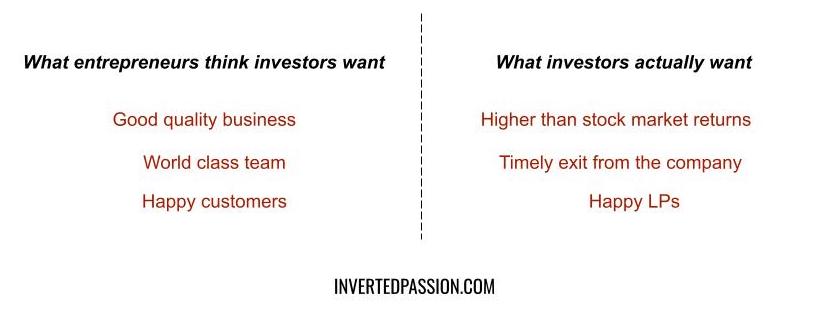Investors like talking about what makes a good business. You’ll find angels and VCs on Twitter constantly talking about what makes a good team, how to get product-market fit, and many other such aspects of startups.

Given the amount of preaching that the investor community does, it is understandable then that many first-time entrepreneurs end up believing that the VC community invests in companies in order to make them better.
There’s some truth to it as investors are incentivized to see their companies improve. But investors invest in a company to get a good financial return in the company. This is a trivial observation but it can be easily overshadowed by the apparent we-exist-to-help-entrepreneurs gyan that is ever pervasive in the VC land. Perhaps the world would be a better place if most VCs openly talk about their own incentives rather than talking about what businesses should be doing.
In case you’re not aware, VCs typically do not invest their own money. They raise money from other places, typically pension funds, family offices, or university endowment funds. These institutions are called limited partners (LPs) in the investment world.
As a diversification strategy, such LPs typically invest a minority of their entire corpus into venture capital or private equity funds. And because investment into private companies comes with a higher risk of the loss of investment, the expectation of LPs from VCs is to compensate that risk by delivering a higher return than what they would have gotten from public equity markets. So if a benchmark index (Dow Jones, Sensex, etc.) has delivered a 12% per year return, the expectation from VCs is to deliver say 18% per year return.
And that 18% return expectation is on the entire fund. Since most startup investments fail to give any return, the expectation from any particular investment is sky-high. Typically, investors are pushing the entrepreneurs to grow the value of their investment by at least 10x And that too within 5-7 years of investment, since that’s what VCs have promised their LPs.
This expectation of making a high financial return to their LPs drives the relationship between investors and entrepreneurs. This is what pushes investors to do all the good and bad things they are known to do. Before raising an investment, an entrepreneur must understand the motivation of an investor and their customers (LPs). A company can only be successful if the entrepreneur is aligned with the motivation of her investors. There must not be any delusion about investors “helping” the company at the expense of doing their duty towards LPs. It doesn’t happen and it’s not fair to expect that to happen.
Investors have a job to do. When you raise money from them, your job becomes helping them do their job better by generating financial returns for the investment they’ve put in. It’s not always the case but it’s possible that such returns could come at the expense of your original motivation of leaving a legacy or creating a good product or working with a bright team. But remember that when you raised an investment, that’s what you signed up for. This is why selecting investors for the company who are aligned to the exact future an entrepreneur is envisioning is perhaps a life-or-death decision for a young company.
Remember: understand the incentive structure of VCs before you raise investment from them. Do a reference check on them to see how they behave when things become difficult for the company.
This essay is part of my book on mental models for startup founders.
Join 200k followers
Follow @paraschopra